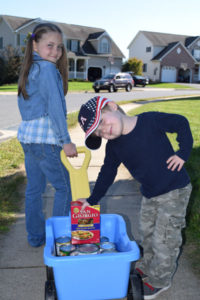
Catoctin Kids For kids and parents alike
by Anita DiGregory
 As the weather turns colder and we draw closer to Thanksgiving and the Christmas season, it is natural for many adults to count their blessings. But as we near this season of giving, how do we keep our children from coming down with a deadly case of the “gimmies,” and instead help instill in them an attitude of gratitude?
As the weather turns colder and we draw closer to Thanksgiving and the Christmas season, it is natural for many adults to count their blessings. But as we near this season of giving, how do we keep our children from coming down with a deadly case of the “gimmies,” and instead help instill in them an attitude of gratitude?
Instilling an Attitude of Gratitude in Our Children
 As the weather turns colder and we draw closer to Thanksgiving and the Christmas season, it is natural for many adults to count their blessings. But as we near this season of giving, how do we keep our children from coming down with a deadly case of the “gimmies,” and instead help instill in them an attitude of gratitude?
As the weather turns colder and we draw closer to Thanksgiving and the Christmas season, it is natural for many adults to count their blessings. But as we near this season of giving, how do we keep our children from coming down with a deadly case of the “gimmies,” and instead help instill in them an attitude of gratitude?
- Practice what we preach. Kids are always watching. Whether we like to admit it or not, they sometimes learn more from what they see us do, than from what we say. Modeling an attitude of gratitude often teaches more than preaching the importance of gratitude. I try to remember to verbally thank God for small blessings throughout the day. By doing so out loud, it helps my children know that I am thankful for the Lord’s help and care. Try to make it a habit to thank others for their assistance. And don’t forget to thank your children when they have behaved in such a way deserving of appreciation! Who doesn’t appreciate a heartfelt, sincere “thank you”?
- Make gratitude a habit. Many families traditionally begin their Thanksgiving meal by having family and friends around the table name something for which they are grateful. Why not make this a regular event? Pick a time when the family is typically gathered together every day, perhaps it is dinnertime or prayer time. Make it a habit each day to begin this time with a moment of thanks. During this period, each member of the family can name at least one thing for which he or she is happy for that day.
- Write it down. When things are written, they become more concrete. This is a way to get children of all ages involved. Younger children may enjoy completing a simple gratitude exercise each day. This could be as simple as constructing a gratitude chain or even a gratitude tree. To complete the chain, each child can write on a strip of paper what he or she is grateful for each day. As a new strip is completed, it is then wrapped around the others to form an interlocking gratitude chain, which can be hung as a decoration on Thanksgiving. To construct the gratitude tree, brown construction paper can be used to fashion the trunk of the tree. Simple leaf shapes in autumn colors can be cut out. Each day, the child can name something he or she is thankful for and it can be printed on a leaf that is then added to the tree. Older children may enjoy keeping a gratitude journal. A family project could be making a gratitude jar, where each day each family member lists on autumn-colored strips of paper for what they are thankful. The filled jar can then be used as a centerpiece at the dinner table on Thanksgiving.
- Put it in a letter. Help your child design a thank you card or write a note of thanks to someone. This could be addressed to a family member, a favorite teacher or coach, a community helper, or a friend. You can also help them write and send a letter to Veterans, thanking them for their service and sacrifice. Regardless of who your child chooses, it is a win-win for both your child and the recipient.
- Foster a spirit of giving. Have you ever noticed that when you are helping others, you don’t have time to think of yourself? By encouraging our children to focus on helping others, they will stop focusing on themselves. Help them collect canned food donations from neighbors and friends, and then take them to deliver their collection to the local food bank. Encourage them to donate some of their gently used clothes and toys to a shelter or church thrift store.
- Pay it forward. Aa miracle cure for the “gimmies” is performing small acts of kindness for others. Take your child to visit with elderly family members, friends, or neighbors. Help your child think of small acts of kindness they can do for others in need, such as raking leaves for a sick neighbor.
- At the end of the day, PRAY. You may have heard the old adage, “A family that prays together, stays together.” There is a reason for that: Prayer is powerful. Praying with your children teaches them that there are things way more important than the “gimmies.” Offer words of thanksgiving. Pray for each other and for others.
